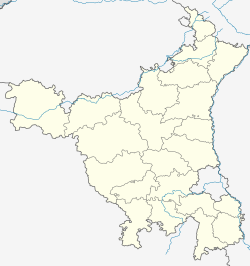Topra Kalan
| Topra | |
|---|---|
| village | |
| Location in Haryana, India | |
| Coordinates: 30°07′31″N 77°09′44″E / 30.1252°N 77.1623°ECoordinates: 30°07′31″N 77°09′44″E / 30.1252°N 77.1623°E | |
| Country |
|
| State | Haryana |
| Founded by | Mauryan Empire |
| Languages | |
| • Official | Hindi |
| Time zone | IST (UTC+5:30) |
| Vehicle registration | HR |
| Website | haryana |
Topra, combined name for the larger Topra Kalan and adjacent smaller Topra Khurd, is a Mauryan Empire-era village in Yamunanagar district of Harayana state in India. It lies 14 km west of Yamunanagar, 14 km from Radaur and 90 km from Chandigarh.
Delhi-Topra Ashokan pillar at Firoz Shah Kotla as it stands today.|thumb|right|300px]]
Situated in Pong valley of is the original home of Delhi-Topra Ashokan pillar, one of many pillars of Ashoka, that was moved from Topra to Feroz Shah Kotla in Delhi in 1356 CE by Firuz Shah Tughlaq (1309-1288 CE). The original inscription on the Delhi-Topra Ashokan obelisk is primarily in Brahmi script but language was prakrit, with some Pali and Sanskrit added later. The inscription was successfully translated in 1837 by James Prinsep. This and other ancient lats (pillars, obelisk) have earned Firoz Shah Tughlaq and Delhi Sultanate fame for its architectural patronage.
The Sultanate had wanted to break and reuse the Ashokan pillar for a minaret. Firoz Shah Tuhglaq, however decided to erect it near the mosque instead. At the time of re-installation of the obelisk in Delhi, in 1356, no one knew the meaning of the script engraved in the stone.
About five hundred years later, the script (Brahmi) was deciphered by James Prinsep in 1837 with help from scripts discovered on other pillars and tablets in South Asia.
It was restored by the Raja Hindu Rao after the Revolt of 1857.
...
Wikipedia


